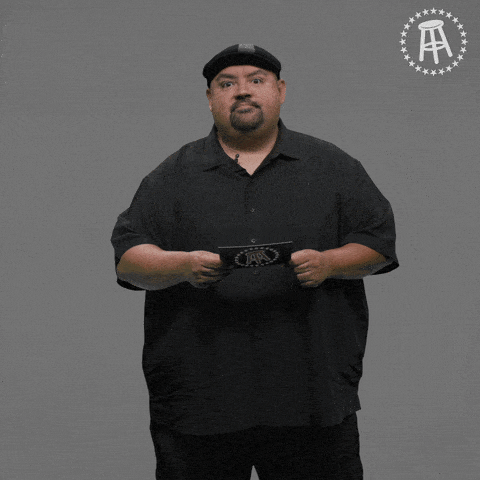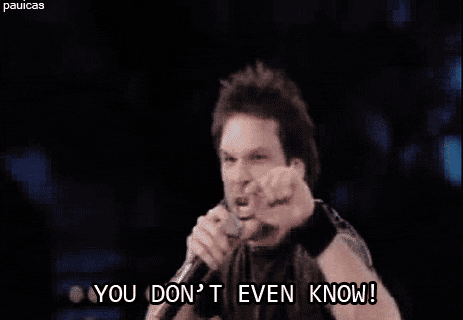Are Comedians The Only Arena Rock Stars Left?

Interested in checking out John Mulaney on his current stand-up tour? You can catch him at traditional arena-rock hot spots like Red Rocks Amphitheatre in Colorado, the Forum in Los Angeles or Chicago’s United Center.

Fallon Tonight
Or how about that recently announced Chris Rock/Kevin Hart joint? On their “Only Headliners Allowed” mini-tour (a reference to the limited number of shows, not Hart’s height), the two comics are popping back and forth between New York and New Jersey’s biggest venues like the Prudential Center, Madison Square Garden, and Brooklyn’s Barclay Center.

Giphy
And this summer, Gabriel Iglesias will be the first comic to ever play Dodger Stadium. He sold out the first show so he had to add a second.

Barstool Sports
Today’s biggest comedians are abandoning cozy comedy clubs for stadiums, arenas, and coliseums. That’s a lot of comedy fans -- and concert promoters are noticing.
"Comedy is kind of having a moment right now in a way that it hasn’t had for a while,” says Sam Kinken, who oversees comedy touring at AEG Presents.
Matt Blake, head of comedy touring for Creative Artists Agency, agrees. "We’ve got more acts touring in a bigger way, really than ever before.”
The numbers back up the claims. Pre-pandemic, only five of the top 100 touring acts in North America were comedians, according to Pollstar. But now that number has doubled, with a number of comics cracking the top 50, including Iglesias, Dave Chappelle, Sebastian Maniscalco, Jo Koy, Jeff Dunham, Jerry Seinfeld, Jim Gaffigan, and Bert Kreischer.
“It’s crazy how stand-up has changed,” says Gaffigan, presumably in his high-pitched alter-ego voice. “I never contemplated performing at the arena at Madison Square Garden. That’s where you see a Bruce Springsteen perform or the Knicks play—not a pale, doughy guy talk about being lazy and food.”

Jim Gaffigan
Good for comedy! But … why now?
We’ve Got A Few Theories
We’re bummed out.
"People are looking for laughter in a stressful time,” says comedy manager Joe Meloche said. "I think we’re seeing that in the pandemic. It’s unity through laughter.”
And since it’s finally safe to tip-toe out of the house -- at least for now -- we’re ready to get our laugh on.
“Finding humor in things has become more valuable and necessary to me than ever,” says comedian Ray Ellin. “What’s going on is so horrible and so absurd, it’s sort of triggered something in me that’s made me more sarcastic and more biting but in a good, funny way.”
Comedy is nimble
With Covid restrictions easing, venues are eager to book again. And strictly from a practical point of view, comedy is an easier show to get back on the road. Bands are messy -- tour busses full of musicians, roadies, techies, and groupies, along with trucks stuffed with amplifiers, pyrotechnics, and miniature representations of Stonehenge.
Comedians, on the other hand, are relatively low maintenance. It’s just a person and a microphone, so getting back on the road is “just a heck of a lot easier,” says Kinken.
Social butterflies
This isn’t the first time comedy is having an arena moment. In the mid-2010s, long thinkpieces were written about Aziz Ansari, Louis C.K. and Amy Schumer taking over the big venues. At the time, pundits gave the credit to social media.
While comics used to hustle to get the word out about upcoming shows, a few million followers can now be reached with a single tweet. How do you think Dane Cook was selling out all those hockey arenas? “I remember getting ready to play Madison Square Garden,” says Cook. “I posted once on MySpace and without spending a dime on any promotion or advertising, we sold out.”

Giphy
Twitter and Instagram have kept the party going, and now we can add streaming to the mix. Netflix has a new stand-up special dropping nearly every week, giving more comics access to the mainstream fame needed to sell out huge locations.
So … good for comedy! Or is it?
Swallowed up
“Madison Square Garden was never a goal or something I contemplated,” says Gaffigan. “I believe stand-up should remain an intimate experience.”
Getting elevated to arena status can be thrilling -- but also crushing. It’s part of what made Steve Martin leave stand-up comedy altogether. He was one of the original rock-star comics (even playing his Top 40 hit King Tut in concert) -- and as he related in Born Standing Up, he hated the experience.

NBC
“The nuances of stand-up still thrilled me, but nuance was difficult when you were a white dot in a basketball arena,” says Martin. “This was no longer an experiment; I felt a huge responsibility not to let people down. Arenas of twenty thousand and three-day gigs of forty-five thousand were no place to try out new material. I dabbled with changes, introducing a small addition or mutation here and there, but they were swallowed up by the echoing, cavernous venues.”
Martin’s timing was getting destroyed by audience disruptions, including whoops, shouts, and gifts thrown to the stage from the rafters. (One was a homemade t-shirt wrapped around a beer can so the toss would make it to the stage. Only the beer can arrived.) He could no longer engage with hecklers or other audience morons -- when there are 17,000 fans in the audience, who could hear the joker that Martin was responding to?
“I realize that I misunderstood what my last year of stand-up was about,” he now says. “I had become a party host, presiding not over timing and ideas but over a celebratory bash of my own making.”
Martin finished his contracted tour dates and never did stand-up again.
Well, OK, he sort of did stand-up again. While he’s given up his old act, Steve and Martin Short have taken their comedy friendship on the road, performing a mix of jokes, characters, sketch routines, and of course, banjo picking.
The Only Murders in the Building stars are currently on tour. And they’re playing arenas.
For ComedyNerd exclusive content and more, subscribe to our fancy newsletter:
Top images: Shutterstock
